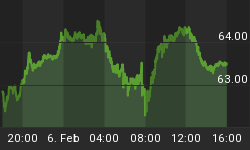Over the past several weeks stocks have staged a mild recovery following their violent correction. While this has led many investors to reenter the markets, unfortunately these bounces appear totally unfounded. Most are simply traders taking advantage and buying on dips, but these moves are based totally on technical indicators and market internals - not economics.
In fact, the market has actually seen modest bounces simply when data being released isn't as bad as expected. Sadly, this doesn't make the data good. The Chicago Purchasing Managers Index, or PMI, released on Wednesday, August 31st, fell, but not the decline was less than expected, so stocks bounced.
Similarly, the ADP Employment report, also released on Wednesday, showed that the private sector added roughly 91,000 jobs in August, not quite the 100,000 that were anticipated. Plus, the number of jobs added in July was revised to 109,000 from 114,000.
Neither of these figures reflect positively for the economy, particularly not when other, more dreary data is considered.
Chief among this more pessimistic data is growth in Gross Domestic Product (or, more accurately, lack thereof), which recently dipped below 2% on a year-over-year basis. This is a point that has been repeatedly hammered by a select few financial pundits who are aware that every time US GDP growth has slipped below the 2% mark, the country enters a recession in short order.
As many readers will note, we had been anticipating this development for some time, just as we have been anticipating another US recession. Now these predictions are coming to fruition. In fact, we would argue right now that the United States is already in recession, and that this will be reflected in economic data that will be released - and revised - in the future.
For those looking to the Federal Reserve for help, we've written before and will reiterate here that neither the economy nor the markets will get any support from the Fed. The latest minutes from the Fed show an increasingly divided Board of Governors.
While the Fed would never admit it, they are essentially out of ammunition when it comes to lending support to the markets or the business community. They pull the trigger and we can hear the 'click' from here. Now Bernanke's Fed is talking about setting target levels for inflation and unemployment, which echoes back to the misery index that Reagan used to defeat Carter in 1980.
Oddly enough, Bernanke has been saying for four years that he wanted to see an uptick in inflation in order to get the economy going. So far he has failed to either achieve higher inflation or put it to work jumpstarting the US economy. So what makes him think it will work now?
As the market reacts to new data, and tries to keep its footing without the support of the Fed's quantitative easing programs, investors have plenty of reason to look forward. First, there's the Obama jobs plan, which the markets have been eagerly awaiting for weeks. Plus, Congress is about to resume session after a nice vacation. Finally, we're looking at a possible reversal of some key court rulings on issues involving the National Labor Relations Board, the EPA, and others.
While many of these - the court decisions, the jobs plan, and any change in Congressional policy after its break - may be fundamentally good for America's business community, they may very well still weigh on markets. After all, as we've written time and again, markets hate uncertainty, and these developments only introduce more doubt about the role of government in business going forward.















